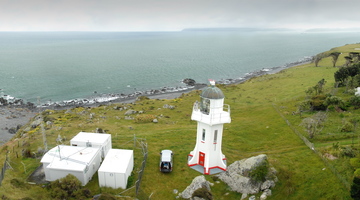NIWA scientists collect air samples from an atmospheric research station at Baring Head on Wellington's south coast. What's in the air that we breathe?
Transcript
Phil Kendon
On Wellington’s south coast there is a site just on the east of Wellington Heads where, when the air blows from the south, it’s very, very clean and it’s representative of the air of the entire southern hemisphere. The scientists at NIWA are interested in measuring air on a global scale: What’s happening to the air right around the world. When the wind blows from the north at Baring Head, it’s blowing over the land and the air will contain not only what’s representative of the whole southern hemisphere, but also local effects from traffic around Wellington area, herds of cows up the road on the farms towards Wainuiomata … so that will contaminate the reading from the southern hemisphere. So you are looking for a global effect, not a local effect.
The [air from the] area’s collected and measured in three different ways really. Firstly there’s a system which actually uses an infra-red analyser out at Baring Head, so in that way it is not collected at all, the air is just run continually through an analyser. A record of carbon dioxide is measured in that way, and the same with oxygen. Air is also actually collected in glass flasks. The flasks, and the tanks, that the air is filled into at Baring Head, are transported back to the lab here at Greta Point in Wellington, and the technicians here run the samples through a gas chromatograph to work out the concentration of the gases that they’re interested in: carbon dioxide, methane, nitrous oxide, and also carbon monoxide.




